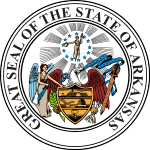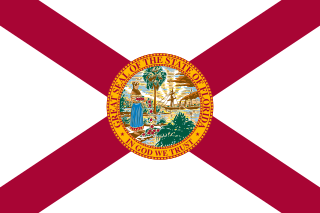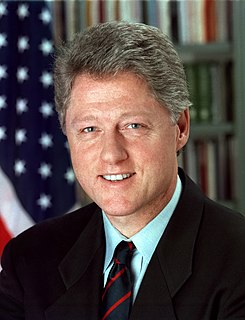
Orval Eugene Faubus was an American politician who served as 36th Governor of Arkansas from 1955 to 1967. In 1957, he refused to comply with a unanimous decision of the U.S. Supreme Court in the 1954 case Brown v. Board of Education, and ordered the Arkansas National Guard to prevent black students from attending Little Rock Central High School. This event became known as the Little Rock Crisis.
Joe Edward Purcell was Acting Governor of Arkansas for six days in 1979 as well as Arkansas Attorney General from 1967–1971 and the 13th Lieutenant Governor of Arkansas from 1975–1981.
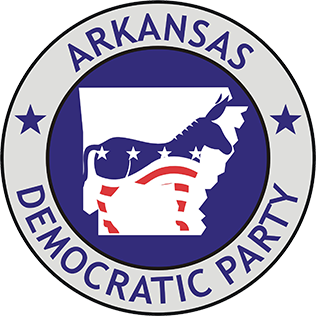
The Democratic Party of Arkansas is the affiliate of the Democratic Party in the state of Arkansas. It is responsible for promoting the ideologies and core values of the national Democratic Party in Arkansas.
Kenneth Lloyd Coon Sr., known as Ken Coon, is a Little Rock educator, professional psychologist, and counselor who was also a pioneer in the development of the Republican Party in the U.S. state of Arkansas. He was the GOP state chairman from 1988–1990. Earlier, he was the party's nominee for lieutenant governor in 1972, its executive director (1973–1975), and its gubernatorial candidate in 1974. He also ran for the United States House of Representatives in 1996 but lost in the primary.

Len Everette Blaylock Sr., was a farmer, educator, small businessman, and Republican politician from Nimrod in Perry County in northwestern Arkansas. He was state welfare commissioner under Governor Winthrop Rockefeller, the GOP gubernatorial nominee (1972), the United States marshal for the Eastern District of Arkansas (1975–1978), the appointments secretary for Governor Frank D. White (1981–1983), and the chairman of the Arkansas Republican Party (1985–1986).
Charles Taylor Bernard, Sr. was an American businessman and politician originally from Earle in Crittenden County in eastern Arkansas. He is best known as the 1968 Republican nominee for the United States Senate seat held by long-time Democrat J. William Fulbright of Fayetteville.
Henry Middleton Britt, III, was a Hot Springs lawyer and a pioneer in the revitalization of the Republican Party in the heavily Democratic state of Arkansas, primarily during the 1960s and 1970s. He was the Republican gubernatorial nominee in 1960, having been decisively defeated by Orval Eugene Faubus. In 1966, he was elected judge of the 18th Judicial Circuit of Arkansas, having served from 1967 to 1983. Britt was also a peripheral figure in the granting of repeated draft deferments in the late 1960s to future Governor of Arkansas and US President Bill Clinton, which made not have to join the US Army.
Willis Harvey Ricketts, known as Bubs Ricketts, was the 1962 Republican gubernatorial nominee in the U.S. state of Arkansas, having been overwhelmingly defeated by the incumbent Democrat Orval Faubus.

Aylmer Lynn Lowe, known as A. Lynn Lowe, was an American farmer and politician from Garland near Texarkana in Miller County in southwestern Arkansas, who was a major figure in the Arkansas Republican Party. He was the Republican gubernatorial nominee in 1978 against the Democrat Bill Clinton, served as state party chairman from 1974 to 1980, and was the GOP candidate in Arkansas's 4th congressional district in 1966, having been defeated by the Democrat David Pryor, then a state representative and a future governor and U.S. Senator, originally from Camden in Ouachita County in south Arkansas.
Virginia Lillian Morris Johnson was the first woman to seek the office of governor of Arkansas. She ran as a Democratic in the 1968 primary election.
Louis Leon Griffith was a master plumber from North Little Rock, who was the Arkansas Republican gubernatorial nominee in 1976, losing the election to Democratic incumbent Governor David H. Pryor.

Odell Pollard was an attorney in Searcy in White County in central Arkansas, who was a pioneer in the revitalization of the Arkansas Republican Party in the 1960s and 1970s.
Osro Cobb was a Republican lawyer who worked to establish a two-party system in the U.S. state of Arkansas. In 1926, he was elected to the Arkansas House of Representatives from Montgomery County and served as the only Republican member in the chamber for two two-year terms. He was the United States attorney for the United States District Court for the Eastern District of Arkansas during the Little Rock Crisis of 1957–1958. He served a year on the Arkansas Supreme Court in 1966 as a temporary appointee of Democratic Governor Orval Faubus.
Danny Lee Patrick was an educator and farmer from rural Delaney in Madison County, Arkansas, who served from 1967 to 1970 as a Republican member of the Arkansas House of Representatives for Madison and neighboring Carroll counties in the northwestern corner of his state. His legislative service coincided exactly with the administration of Winthrop Rockefeller, Arkansas' first GOP governor since Reconstruction.
James Ray Caldwell, known as Jim R. Caldwell, is a retired Church of Christ minister in Tulsa, Oklahoma, who was a Republican member of the Arkansas State Senate from 1969 to 1978, the first member of his party to sit in the legislative upper chamber in the 20th century. His first two years as a senator corresponded with the second two-year term of Winthrop Rockefeller, the first Republican governor of Arkansas since Reconstruction. Caldwell was closely allied with Rockefeller during the 1969-1970 legislative sessions.
William Leach Spicer was a businessman from Fort Smith, Arkansas, who from 1962 to 1964 was the embattled state chairman of the Arkansas Republican Party.
Marion Harland Crank was a Democratic politician from Foreman in Little River County in the U.S. state of Arkansas. He served in the Arkansas House of Representatives from 1951 to 1968. He was the Speaker of the Arkansas House of Representatives from 1963 to 1964 and his party's gubernatorial nominee in 1968, but he was narrowly defeated by the incumbent Republican Winthrop Rockefeller.
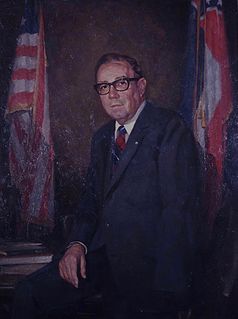
The 1967 Mississippi gubernatorial election took place on November 7, 1967, in order to elect the Governor of Mississippi. Incumbent Democrat Paul B. Johnson Jr. was term-limited, and could not run for reelection to a second term.
